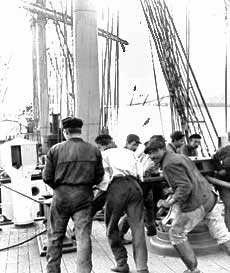Fishing Isn't Just for Dudes
Tim Lambert
Fields Response
It is a widely known fact that fishing in Alaska is difficult. But for women, this profession has added difficulties than just the regular 20-hour shifts and intense physical labor. In Leslie Leyland Fields’ book The Entangling Net: Alaska’s Commercial Fishing Women Tell Their Lives, the author has women who have broken into that industry tell their stories of strife and how they overcame it. Women trying to make a living fishing the Alaskan waters also have to deal with prejudice and sexism from the men who feel that there is no place for a woman in fishing.
Fields starts out her book by sharing stories of how four women got their first jobs on fishing boats. Most of them had had fishing experience, which helped, but they still found it very difficult to find jobs. Virginia Adams had to accept a job at “half share-6 percent” because the skipper felt he was taking a risk (16). Much like men, women have to “walk the docks” early in the season to find jobs. Women were often met with rude comments and made to feel inferior. Once, when Lisa Jakubowski was walking the docks looking for work, “I remember a bunch of guys once saying, ‘Yeah we need someone but not you! Ha! Ha!” (61). This added difficulty to the work of becoming and being a fisherman really shows the determination of these women.
On top of dealing with discrimination, women also have to deal with a large amount of what some would call sexual harassment. Virginia Adams had more than one run-in with harassment. While walking the docks, some would say, “’Yeah, you can come on if you’ll…’ You just roll your eyes, turn around, walk away, realize that person’s a jerk and hopefully things will work out” (55). Some, like Laurie Knapp, were harassed for doing jobs that were primarily done by men, like using hydraulic machinery on a tender. Skippers from other boats would say, “’I don’t want her running the hydraulics.’ And I would walk right up to them and say, ‘Well then, go to a different tender.’” (68). Knapp also states, “It hard to get men to work as hard as women do,” which does seem logical considering all of the extra work women must to do to prove themselves.
Even though these women have faced more adversity than the common male sailor, they are able to do their job and do it well. Theresa Peterson tells stories of working 24 hours before getting just a few hours of sleep, “The first week we averaged ten hours of sleep all together-we figured it out. So we joked, twenty-four on, one off” (31).Despite all of these hardships, some women have become skippers and have prospered very well in the Alaskan fishing industry. Mary Jacobs has been a skipper since 1979 and “consistently finishes most season in the top 10 percent of the fleet,” (75).
In jobs involving physical labor, women have always had to prove to men that they were able to do the work just as well as any man. Men have traditionally held the jobs that involve being physical and strong, such as fishing in the waters off of Alaska. However, with the women’s liberation movement, women have become more and more common with jobs such as these and have proven themselves good workers. The women telling their stories in The Entangling Net are paving the way for other women to come along and get involved in the commercial fishing industry.

